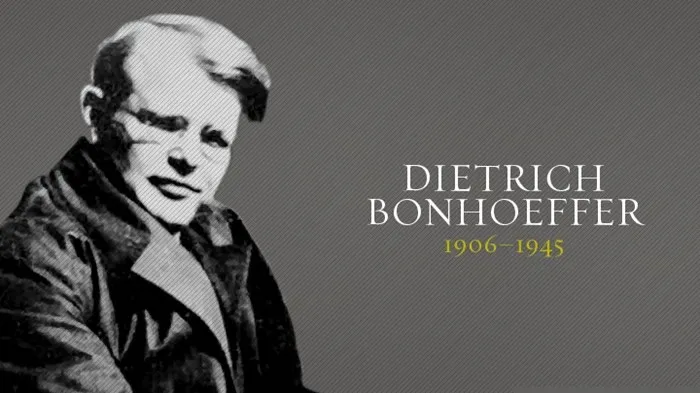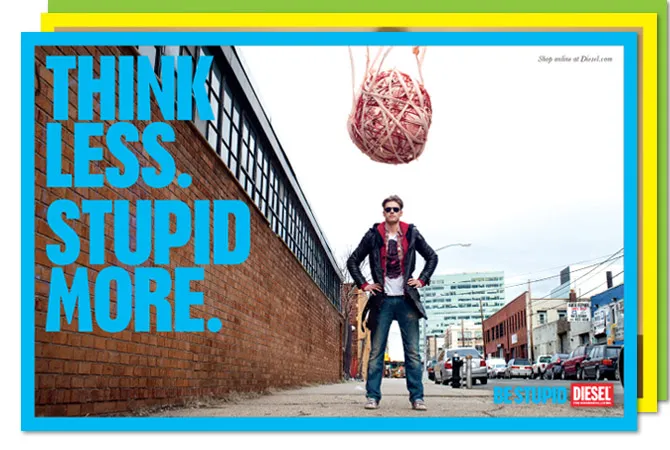
Source / Извор: christianitytoday.com

“Cheap grace is preaching forgiveness without requiring repentance, baptism without church discipline, Communion without confession. … Cheap grace is grace without discipleship, grace without the cross, grace without Jesus Christ, living and incarnate.”
— Dietrich Bonhoeffer, German theologian and resister
In his lectures and interviews, Professor Slobodan Reljić often refers viewers to Dietrich Bonhoeffer’s short essay ‘On Stupidity’. Today we present that extraordinary thinking in its entirety.
Original Text auf Deutsch: Von der Dummheit. Von Dietrich Bonhoeffer
Dietrich Bonhoeffer: On Stupidity
Stupidity is a more dangerous enemy of the good than malice. One may protest against evil; it can be exposed and, if need be, prevented by use of force. Evil always carries within itself the germ of its own subversion in that it leaves behind in human beings at least a sense of unease. Against stupidity we are defenseless. Neither protests nor the use of force accomplish anything here; reasons fall on deaf ears; facts that contradict one’s prejudgment simply need not be believed- in such moments the stupid person even becomes critical – and when facts are irrefutable they are just pushed aside as inconsequential, as incidental. In all this the stupid person, in contrast to the malicious one, is utterly self-satisfied and, being easily irritated, becomes dangerous by going on the attack. For that reason, greater caution is called for than with a malicious one. Never again will we try to persuade the stupid person with reasons, for it is senseless and dangerous.If we want to know how to get the better of stupidity, we must seek to understand its nature. This much is certain, that it is in essence not an intellectual defect but a human one. There are human beings who are of remarkably agile intellect yet stupid, and others who are intellectually quite dull yet anything but stupid. We discover this to our surprise in particular situations. The impression one gains is not so much that stupidity is a congenital defect, but that, under certain circumstances, people are made stupid or that they allow this to happen to them. We note further that people who have isolated themselves from others or who live in solitude manifest this defect less frequently than individuals or groups of people inclined or condemned to sociability. And so it would seem that stupidity is perhaps less a psychological than a sociological problem. It is a particular form of the impact of historical circumstances on human beings, a psychological concomitant of certain external conditions. Upon closer observation, it becomes apparent that every strong upsurge of power in the public sphere, be it of a political or of a religious nature, infects a large part of humankind with stupidity. It would even seem that this is virtually a sociological-psychological law. The power of the one needs the stupidity of the other. The process at work here is not that particular human capacities, for instance, the intellect, suddenly atrophy or fail. Instead, it seems that under the overwhelming impact of rising power, humans are deprived of their inner independence, and, more or less consciously, give up establishing an autonomous position toward the emerging circumstances. The fact that the stupid person is often stubborn must not blind us to the fact that he is not independent. In conversation with him, one virtually feels that one is dealing not at all with a person, but with slogans, catchwords and the like that have taken possession of him. He is under a spell, blinded, misused, and abused in his very being. Having thus become a mindless tool, the stupid person will also be capable of any evil and at the same time incapable of seeing that it is evil. This is where the danger of diabolical misuse lurks, for it is this that can once and for all destroy human beings.
Yet at this very point it becomes quite clear that only an act of liberation, not instruction, can overcome stupidity. Here we must come to terms with the fact that in most cases a genuine internal liberation becomes possible only when external liberation has preceded it. Until then we must abandon all attempts to convince the stupid person. This state of affairs explains why in such circumstances our attempts to know what ‘the people’ really think are in vain and why, under these circumstances, this question is so irrelevant for the person who is thinking and acting responsibly. The word of the Bible that the fear of God is the beginning of wisdom (Psalms 111, 10), declares that the internal liberation of human beings to live the responsible life before God is the only genuine way to overcome stupidity.
But these thoughts about stupidity also offer consolation in that they utterly forbid us to consider the majority of people to be stupid in every circumstance. It really will depend on whether those in power expect more from people’s stupidity than from their inner independence and wisdom.
— Dietrich Bonhoeffer, from ‘After Ten Years’ in Letters and Papers from Prison. Taken from a circular letter, addressing many topics, written to three friends and co-workers in the conspiracy against Hitler, on the tenth anniversary of Hitler’s accession to the chancellorship of Germany. Bonhoeffer was hanged by Adolf Hitler in 1945.

„Јефтино милосрђе је проповедање опроштаја без потребе за покајањем, крштење без црквене дисциплине, причешће без исповести. … Јефтино милосрђе је милосрђе без припадништва, милосрђе без крста, милосрђе без Исуса Христа, живог и оваплоћеног.“
— Дитрих Бонхофер, немачки теолог и побуњеник
Професор Слободан Рељић у својим предавањима и наступима често упућује гледаоце на кратки есеј Дитриха Бонхофера ‘О глупости’. То изванредно промишљање представљамо данас у целости.
Оригинални текст на немачком: Von der Dummheit. Von Dietrich Bonhoeffer
Дитрих Бонхофер: О глупости
Глупост је опаснији непријатељ добра него што је зло. Против зла можемо протестовати, можемо га раскринкати, можемо га, ако устреба, силом спречити. Зло вазда у себи носи клицу самоуништења, будући да оставља у човеку макар нелагодност. Против глупости смо беспомоћни. Ни протестима ни силом ту се ништа не може учинити; разлози ту не помажу; чињеницама које противрече личној предрасуди једноставно се не верује – у таквим ситуацијама глупан чак постаје критичар – па иако су чињенице непорециве, могу се једноставно заобићи као безначајни појединачни случајеви. При томе је глупан за разлику од злог човека собом до краја задовољан; да, он постаје озбиљно опасан, будући да се лако раздражи и прелази у напад. Због тога је потребно више опреза пред глупаном него пред злим човеком. Никад се више нећемо служити разлозима да уверимо глупана; то је бесмислено и опасно.Да бисмо знали како с глупошћу изаћи на крај, морамо се трудити да схватимо њену суштину. Једно је сигурно, она у суштини није дефект интелекта, него људскости. Постоје људи изванредно живахног интелекта који су глупи и људи веома тромог интелекта који су све друго само не глупи. То у неким ситуацијама са изненађењем откривамо. При томе се мање стиче утисак како је глупост неки урођени дефект, него, напротив, да се од људи у одређеним приликама праве глупани, односно да они допусте да их учине глупима. Опажамо, даље, да људи који живе издвојено и самотно ређе показују тај дефект него људи и групе људи који су склони и осуђени да живе у друштву. Тако изгледа да је глупост можда мање психолошки, а више социолошки проблем. Она је посебна форма утицаја историјских ситуација на човека, психолошка нуспојава одређених спољних прилика. Kад ствар осмотримо боље, опажамо да сваки јачи развој спољне моћи, било политичке било религијске природе, инфицира глупошћу велики број људи. Заиста изгледа да је то социолошко-психолошки закон. Моћ једних има потребу за глупошћу других. При томе се не ради о томе да би неке одређене – дакле можда интелектуалне – моћи изненада закржљале и нестале, него да под прејаким утиском развоја моћи човек губи своју унутрашњу самосталност те се – више или мање несвесно – одриче личног односа према одређеним животним ситуацијама. То што је глупан често пута тврдоглав, не сме нас навести на помисао да је он самосталан. Управо у разговору осећамо да уопште немамо посла с њим самим, њим лично, него с крилатицама и с паролама које су њиме овладале. Он је у некаквом изгнанству, он је заслепљен, злостављан у свом властитом бићу. Поставши тако безумним инструментом, глупан ће бити способан за зло и у исто време неспособан да препозна зло. Ту лежи опасност ђаволске злоупотребе, јер управо је то оно што заувек може уништити људска бића.
Зато је сасвим јасно да се глупост не може превладати објашњавањем, него једино ослобађањем. При томе морамо се помирити с тим да је право унутрашње ослобођење у највећем броју случајева могуће тек онда кад се догоди спољашње ослобођење; све дотад мораћемо да одустанемо од свих покушаја да уверимо глупана. Такво стање ствари објашњава зашто су узалудни покушаји да сазнамо шта ‘народ’ стварно мисли, и зашто је то питање тако неважно за особу која одговорно мисли и ради – свакако, само у датим околностима. Библија каже да је страх од Бога почетак мудрости (Пс 111, 10), а то значи да је унутрашње ослобађење људи одговорним животом пред Богом једини истински начин превладавања глупости.
Уосталом, ове мисли о глупости ипак нам пружају и утеху, јер не допуштају да већину људи сматрамо глупима у свакој прилици. Заиста ће све зависити од тога да ли властодршци више очекују од глупости људи, или од њихове унутрашње самосталности и мудрости.
— Дитрих Бонхофер, из 'После десет година' у Писма и папири из затвора. Преузето из циркуларног писма које се бави многим темама, написано тројици пријатеља и сарадника у завери против Хитлера, на десетогодишњицу Хитлеровог заседања на место канцелара Немачке. Бонхофера је Адолф Хитлер обесио 1945. године.

Source / Извор: americandigest.org
Comment
Observing the behavior of rulers who work intensively to dumb down peoples, and historical events such as the crumbling of people into artificial, opposing nations that are easy to manipulate, Bonhoeffer’s short text appears as a searchlight that illuminates the darkest plans in the pitch darkness.Коментар
Посматрајући понашање властодржаца који интензивно раде на заглупљивању народа, и историјске догађаје као што је мрвљење народа у вештачке, супротстављене нације којима је лако манипулисати, Бонхоферов кратки текст појављује се као рефлектор који у тмини осветљава најмрачније планове.
Explaining the phenomenology of stupidity, Dietrich Bonhoeffer reveals to us, perhaps inadvertently, in just a few paragraphs, the sinister mechanism of manipulation of the Centralized Hierarchical Political Matrix. Let's not forget that this entire satanic mechanism was established on the basis of control over the issuance of money. The entire Tower of Babel, designed to enslave people, was built on the control of money. Destroy it, and the entire Centralized Hierarchical Political Matrix will collapse leaving humanity free. Did someone mention Bitcoin?
Dietrich Bonhoeffer did not have a long and happy life, but he left a significant legacy to humanity. Don't miss to share this text.
Објашњавајући феноменологију глупости, Дитрих Бонхофер нам, можда нехотично, у само неколико пасуса, открива злокобни механизам манипулације Централизоване хијерархијске политичке матрице. Не заборавимо да је читав овај сатански механизам успостављен на темељу контроле над издавањем новца. Читава Кула Вавилонска, намењена поробљавању људи, саздана је на контроли новца. Срушите је, и читава Централизована хијерархијска политичка матрица ће се урушити остављајући човечанству слободу. Јел ко поменуо биткоин?
Дитрих Бонхофер није имао дуг и срећан живот, али је човечанству оставио значајно наслеђе. Не пропустите да поделите овај текст.
* * *
Books at Hive / Књиге на Хајву:
Chess for Tigers
Friedrich Dürrenmatt: The Physicists (Part 4 of 4) [eng/срп] Фридрих Диренмат: Физичари (4 од 4)
Friedrich Dürrenmatt: The Physicists (Part 3 of 4) [eng/срп] Фридрих Диренмат: Физичари (3 од 4)
Friedrich Dürrenmatt: The Physicists (Part 2 of 4) [eng/срп] Фридрих Диренмат: Физичари (2 од 4)
Friedrich Dürrenmatt: The Physicists (Part 1 of 4) [eng/срп] Фридрих Диренмат: Физичари (1 од 4)
Dr. Ljubodrag Simonović: The Last Revolution
Библиотека проф. др Милосава Чаркића
Forbidden Bookshelf by prof. Dr. Mark Crispin Miller



Access Hive through Ecency
Приступите Хајву кроз Ecency

Access Hive through Ecency
Приступите Хајву кроз Ecency

Access Hive through On Board
Приступите Хајву кроз On Board

Access Hive through On Board
Приступите Хајву кроз On Board

Bastyon.com

Bastyon.com

Google detox starts here!

Google detox starts here!

Universal Basic Income

Universal Basic Income

Check out ABRA and easily invest in 28 cryptocurrencies or BIT10, an index of the top cryptos. Use this link to sign up and get $25 in free bitcoin after your first Bank/Amex deposit, or 1.5% cash back when you exchange cryptos
 : 1GZQG69sEKiMXKgGw9TcGcUCBoC4sC1ZYp
: 1GZQG69sEKiMXKgGw9TcGcUCBoC4sC1ZYp